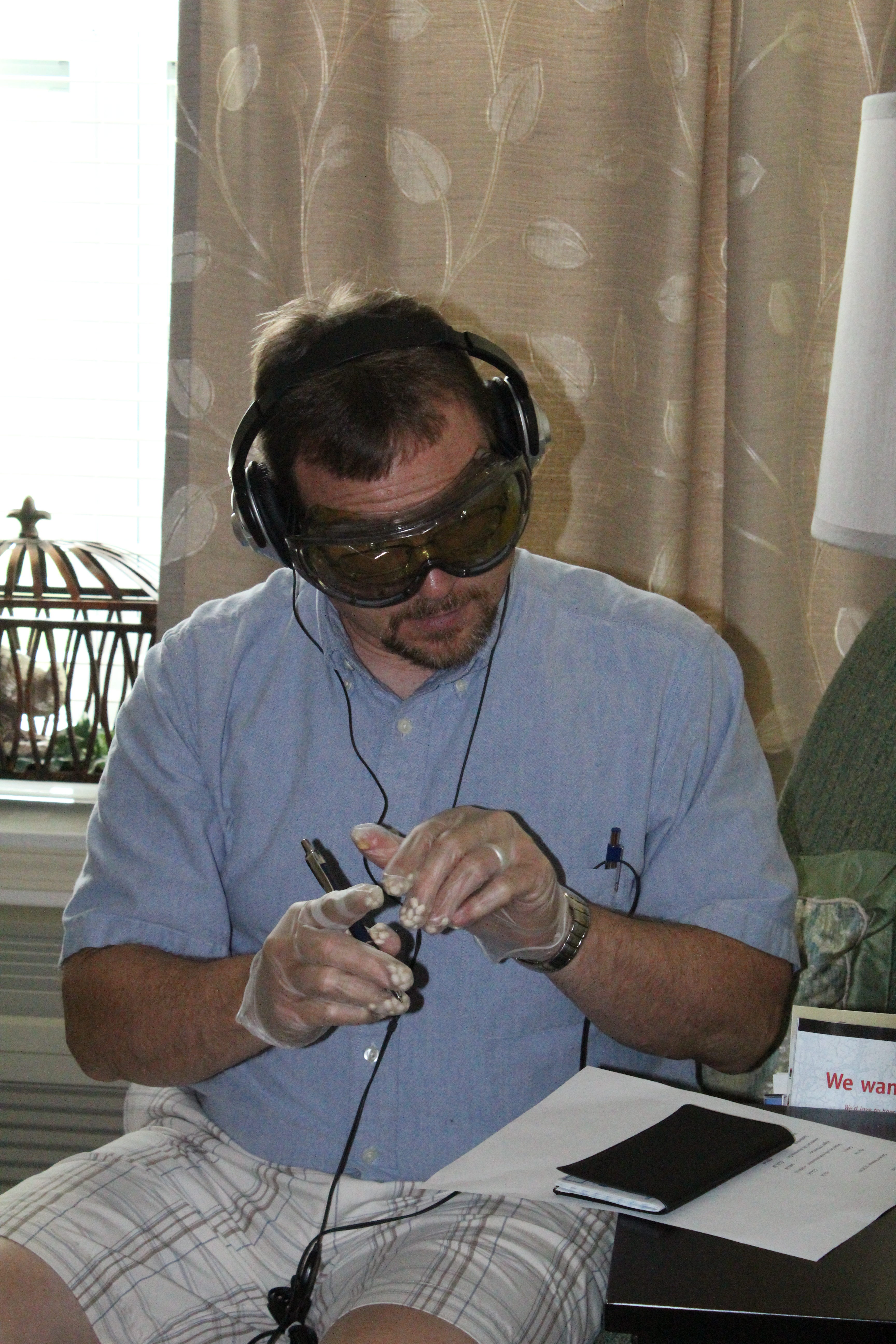By Christina Rice
Oak Pointe Memory Care, Maryville, hosted a dementia simulation on July 12 for community members.
Dr. Sue Myllykangas, NWMSU health science and wellness associate professor, received an internal grant from the university three years ago to purchase equipment and supplies that simulate the symptoms of dementia.
The simulation
Participants were suited up with yellow goggles that decreased their vision. Some goggles mimicked cataracts and were smeary; others duplicated glaucoma and were hazy with the peripheral vision restricted; the remaining goggles imitated other eye diseases.

Vic Coston, chaplain for AseraCare Hospice, attempts to perform a list of tasks while wearing gear to simulate the symptoms of dementia.
Next, staff splinted some of the participants’ fingers so they would not bend, to represent arthritis. Then, the fingertips of large plastic gloves were filled with beans and placed on participants’ hands to decrease the feeling to their fingers.
Finally, each person was outfitted with an iPod playing a person speaking loudly in a foreign language to distort the individual, making it hard to focus on, hear and remember the directions. People with dementia have reported that the ringing in their ears sounds like an unintelligible person talking.
Staff verbally listed a series of tasks that each participant was expected to perform, only giving the directions once. The tasks included normal everyday procedures including balancing a checkbook, writing a letter and putting it into an envelope, folding laundry, sorting pills, counting change and putting on a shirt. Most participants had difficulty remembering to complete all the items or they performed them incorrectly, such as sorting the change instead of counting it or putting on the wrong color shirt.
What is dementia?
According to Myllykangas, dementia disrupts brain neurons which are roadways in the brain leading to information. She compared it to trying to drive to McDonald’s and coming across a closed street. You have to find a new route to reach McDonald’s. Eventually, there are so many closed streets, you can not get to McDonald’s at all.
This is what happens to dementia patients. They are unable to access information in their brains, and for a short time, they will be able to think through alternate routes to find it. As the disease progresses, they will not be able to access the information at all because of too many breaks in the brain’s roadways. They lose critical thinking and reasoning skills.
Dementia has a slow onset and occurs over a period of time. There are more than 100 different kinds of dementia; Alzheimer’s is one.
Eventually, the disease will take everything but emotion and love from a person.
Am I more susceptible to dementia?
According to Myllykangas, scientists have discovered there are genetic markers for dementia, but that does not mean a person will develop the disease. People may develop dementia who do not have the markers. It is believed that a person’s environment, stresses, illnesses and life experiences contribute to the disease, although scientists are still unclear about what exactly causes the disease.
How to communicate with dementia patients
Myllykangas gave participants feedback and tips for caring with individuals with dementia. People need to remember to be patient, offer reassurance by listening attentively and empathizing, minimize the noise for individuals, avoid arguing, use touch to communicate caring, avoid using pronouns, ask questions with yes or no answers to simplify and do not talk about them as if they are not present.
Dementia patients only notice what is directly in front of them, so you need to be face-to-face to communicate. They also are unable to recall certain periods of time. Find out what time period they can remember and then talk about that to help them engage in conversation. Meet them in the reality they are in.
They often feel out of control of their life, so giving them choices helps them to maintain their independence.
Will they forget me?
“The key takeaway is they are still the same person; they are just unable to communicate with you the way they used to. They need love and emotion. If you communicate through emotion, you can communicate with them all the way to the end,” Myllykangas said.
She stated that dementia sufferers will know you, even if they cannot recall your name or how they know you. When they see you, they will always remember the emotional connection they have with you. They will remember that you love and care for them, that they love you, that you are a safe person for them and that you are special to them. They will never forget the emotion and love they have for people.
“They will know who you are until their last breath, even if there is no response,” Myllykangas said.




Facebook Comments